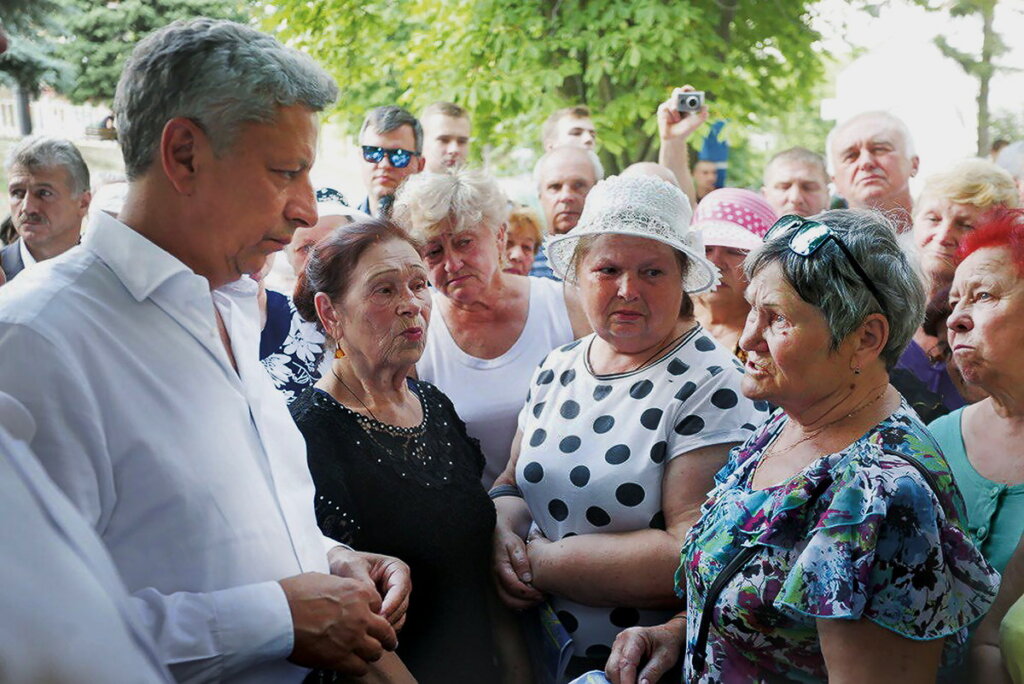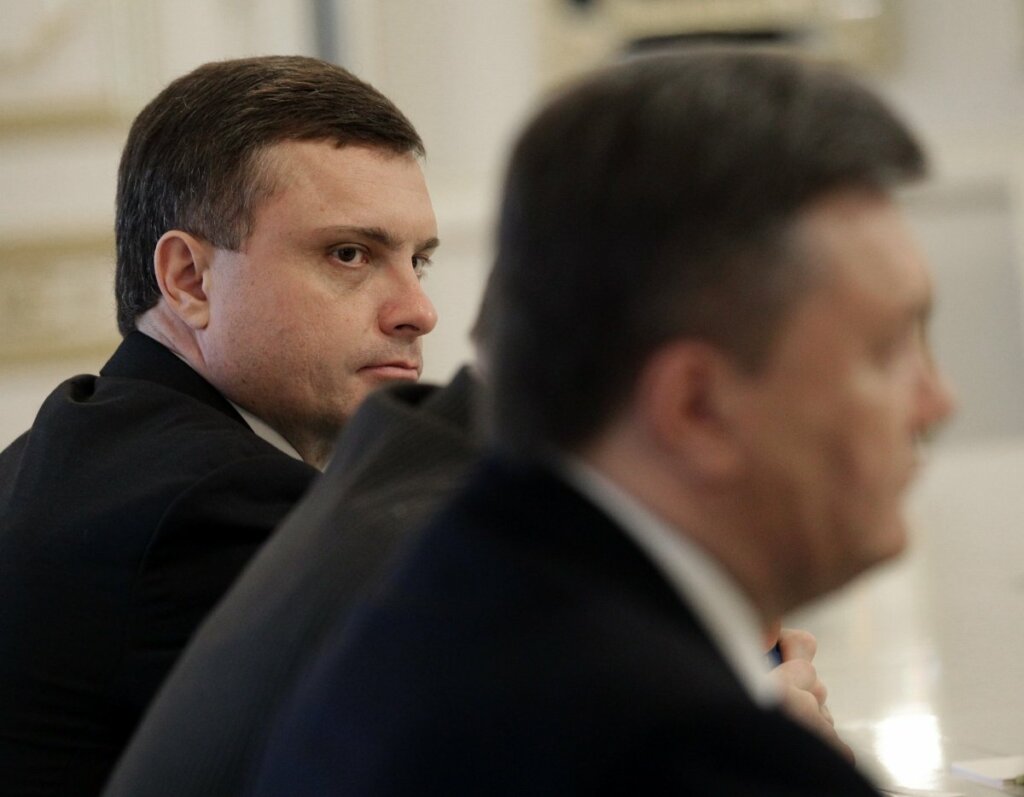One of the paradoxes of Ukrainian politics is that, in the sixth year of Russia’s war against Ukraine, the second most popular party in the race for parliament is a Kremlin-favored political alliance led by a tycoon and close friend of Russian President Vladimir Putin.
Opposition Platform — For Life pushes for good relations with Russia and opposes Ukraine’s drive to join NATO and the European Union. Its leaders travel to Moscow, meet with Russian officials and appear on the state’s propagandistic TV news programs. They claim the United States controls the Ukrainian administration and refuse to admit that Russian-led forces in eastern Ukraine are waging a war that has killed some 13,000 people since 2014.
And that’s just the party’s facade.
A closer look at the Opposition Platform reveals that it is less about Russia and more about resurrecting the old Ukraine, where politics was a get-rich scheme that had little to do with serving the country.
Many of the party’s listed candidates first rose to power and thrived as allies of Russian-backed ex-President Viktor Yanukovych, overthrown by the EuroMaidan Revolution in 2014. Several of them are neck-deep in corruption allegations.
Opposition Platform now polls at 13 percent, behind the clear front-runner in the race, President Volodymyr Zelensky’s Servant of the People party, which absorbed a large chunk of the Platform’s voters.
Opposition Platform supporters “are active pro-Putin voters who have made their decision. There are more people with more moderate views on Russia who have not made up their minds yet,” said political analyst Volodymyr Fesenko. “They have always been in Ukraine. The war did not turn everyone into patriots; it split the society.”
According to Iryna Bekeshkina, a veteran sociologist and director of the Democratic Initiatives Foundation, there are still about 20 percent of Ukrainians with pro-Russian views.
Fesenko says Opposition Platform has a clear target audience: mostly people who previously favored the communists or Yanukovych’s Party of Regions; Russian speakers from Ukraine’s eastern and southern regions, which traditionally had strong economic and cultural ties with Russia; and the residents of war-affected Donetsk and Luhansk oblasts.
In fact, the party did not nominate a single candidate in Ukraine’s western regions of Ternopil, Lviv, and Ivano-Frankivsk.
Two camps
Opposition Platform emerged from the split of its progenitor, the Opposition Bloc, which was built from remnants of Yanukovych’s disbanded Party of Regions in 2014.
With the help of Yanukovych’s former political consultant Paul Manafort — who is currently serving time in a U.S. prison for financial crimes — Opposition Bloc won seats in the post-EuroMaidan parliament and formed a 44-member faction.
But it soon began to fracture into groups, aligned by their business interests. By the end of 2018, Opposition Bloc had split into two camps.
The first camp is led by the oligarch Viktor Medvedchuk and Serhiy Lovochkin, Yanukovych’s former chief of staff, and Lovochkin’s business partner, exiled oligarch Dmytro Firtash, who is wanted in the U.S. on bribery charges that he denies.
The second camp, which kept the name of Opposition Bloc and is significantly less popular, is led by lawmaker Oleksandr Vilkul and backed by billionaire lawmaker Vadym Novynskyi and the richest person in Ukraine, industrialist oligarch and media magnate Rinat Akhmetov.
Medvedchuk factor
Opposition Platform might not have been so successful — and so far ahead of its competitor, Opposition Bloc — were it not for Medvedchuk.
In third place on the party’s list of candidates for parliament, Medvedchuk has utilized his special power: access to Putin. It buttresses his party’s main campaign promise: to bring peace to Ukraine’s east by restoring good relations with Russia.
In 2004, the Russian president became godfather to Medvedchuk’s youngest daughter. Medvedchuk said it was his wife’s idea.
Medvedchuk’s wealth is estimated at $78 million, according to a 2018 index by Ukrainian news magazine Novoye Vremya. A decade ago, it was reported to be several times larger.
Formally, Medvedchuk owns a law firm. In reality, he controls property and companies registered to his wife. Their businesses extend across real estate, agriculture and oil and gas production, including the development of an oil field in Russia.
Medvedchuk has been a longtime figure in Ukrainian politics, never as popular as he was powerful. He served as a leader of an oligarch-backed political party that flopped with voters, as deputy chairman of the Verkhovna Rada and as chief of staff to ex-President Leonid Kuchma. He and his business partners acquired great wealth, including media assets and energy utilities, in the corrupt 1990s. He has also exerted strong control of Ukraine’s courts as a member of the Supreme Council of Justice, starting in 2008.
Political analyst Fesenko notes the “Medvechukization” of television, still the most-consumed media in Ukraine. Medvedchuk, who already controls NewsOne and 112, added the Lviv-based television channel ZIK to his media empire in June. Formally, all three belong to his business partner Taras Kozak, No. 10 on the Opposition Platform party list.
“We can say that Medvedchuk became another Ukrainian oligarch as the owner of several television channels, co-owner of the leading political force, and a major shady dealer on the post-Soviet market,” Fesenko wrote. “Taking into account whose interests he serves, the expansion of his television empire is a challenge to the national security of Ukraine.”
The Kremlin actively aids Medvedchuk. Backed by Russian propaganda outlets and his Ukrainian television channels, the politician is able to throw one news information bomb after another, drawing the ire of the country’s pro-Western majority and often sparking protests by Ukrainian nationalist groups.
He and the co-leader of his party, Yuriy Boyko, met with Russian Prime Minister Dmitry Medvedev in Moscow twice in 2019. Medvedchuk also boasted of having negotiated with Russian-led groups in the Donbas on the release of four Ukrainian prisoners of war.
His NewsOne channel also planned to hold a teleconference with Kremlin propaganda channel Russia‑1, but dropped the idea following a backlash. “He has as much fame and authority as a president,” is one Russia‑1 description of Medvedchuk.
Medvedchuk also appears as “the opposition leader” in U.S. film director Oliver Stone’s latest documentary, “Revealing Ukraine,” which also features Putin. The film will be aired next week on the 112 channel. It is already stirring public outrage for its portrayal of Russia’s war in the Donbas war as a “civil war.”
His peace plan for ending the war calls for direct talks with Russian-backed leaders in the occupied territories, individuals whose authority Kyiv does not recognize. It also calls for the granting of autonomous status to the Donbas within Ukraine.
Medvedchuk was not available for an interview, according to his spokesperson Oleg Babanin.

Yuriy Boyko, one of the leaders of the pro-Russian Opposition Platform — For Life party, meets with voters in Donets, a village in Kharkiv Oblast, on July 2, 2019. (Courtesy) (Opposition Platfor - For Life)
Old faces
In the first spot on Opposition Platform’s candidate list is Yuriy Boyko, former deputy prime minister. The Ukrainska Pravda newspaper once described Boyko’s image as that of a “thrifty plant director” — he is often seen on television touring Ukraine’s regions and talking about pensions and exorbitant gas prices. Such tariffs can be lowered, he says in Russian, if we start buying gas from Gazprom again with the 25 percent discount his party allegedly negotiated on one of their trips to Moscow.
His voter base is solid. In the March 31 presidential election, he finished fourth with 11.7 percent of the vote, and a recent poll showed some 12 percent of voters want him to be Prime Minister.
During his tenure as energy minister, his name was associated with the infamous “Boyko Towers,” a scam involving the sale of two drilling rigs to the state at an inflated price of $800 million. The suppliers were shell companies. Boyko avoided prosecution.
No. 3 on the party list is Ukrainian-Israeli businessperson Vadym Rabinovych who is more widely known these days as a television commentator. He was involved in the launch of NewsOne and also owned a football club. Now he hosts a one-man talk show on the 112 channel, where he usually lambasts the Ukrainian government. He does the same on his own cable channel, Rabinovych TV.
No. 5 on the list is Lovochkin, who despite spending his entire career in public office has managed to amass an estimated fortune of over $100 million, according to Novoye Vremya. Lovochkin shares control of the Inter Media Group with oligarch Firtash, who faces extradition from Austria to the United States on bribery charges. Inter also promotes the Opposition Platform.
Lovochkin was seen on June 25 in a Vienna court with Mikhaylo Papiev, the former governor of Chernivtsi region who is now running for parliament as the 13th candidate on the Opposition Platform’s list. Both said they came to support their friend Firtash.
Many of Lovochkin’s family businesses are registered in the name of his sister, Yulia Lovochkina. By day, however, she is also a lawmaker and No. 21 on the Opposition Platform party list. The siblings own a mansion on the French Riviera and a vast network of some 40 offshore firms through which they control energy companies.
No. 7 is yet another millionaire lawmaker, Nestor Shufrych.
And some of the top 30 spots on the party ticket have been issued to a number of Yanukovych-era ministers and governors: Natalia Korolevska, Serhiy Larin, Mykola Skoryk and others.
There is also a group of former lawmakers from the Party of Regions, such as Yuliy Ioffe and Vitaliy Bort, who voted for Yanukovych’s package of dictatorial anti-protest laws at the height of the EuroMaidan Revolution.

Former Ukrainian President Viktor Yanukovych (R) and his ex-chief of staff, Serhiy Lovochkin, are photographed before an official meeting in Kyiv on March 27, 2013. (UNIAN)
More names
No. 17 is Medvedchuk’s business partner from the 1990s, Grigoriy Surkis, president of the Dynamo Kyiv football club, who co-owns electricity distribution companies in western Ukraine with his brother Ihor.
And Medvedchuk’s younger brother Serhiy is running in single-member district No. 105 in Luhansk Oblast. He controls a construction network in Lviv.
The No. 11 candidate is Kyiv property developer Vadym Stolar, a former member of the Kyiv City Council. Over the years, he has changed his allegiances often. Ukrainian media have labeled him the “gray cardinal of Kyiv” due to his influence. Stolar has been linked to several controversial construction projects in the city, as well as a scheme that defrauded hundreds of homebuyers during the mid‑2000s.
Once a chief investigator of economic crimes, No. 23 candidate Grigoriy Mamka failed the qualification test to join the reformed police service in 2015 and was fired. However, he managed to get his job back by appealing in court. Ex-Odesa governor Mikheil Saakashvili claimed Mamka was “a pillar of racketeering and the old police’s interference with business.”
No. 30 is Oleg Voloshyn, a former spokesman for the Foreign Ministry and head of the 112 television channel’s international service. He made headlines in the U.S. after the Kyiv Post published his op-ed whitewashing Manafort’s work in Ukraine, who then was under investigation by U. S. Special Counsel Robert Mueller.
Manafort was suspected of ghost-writing the op-ed in violation of a court order prohibiting him to influence his case in the press. Eventually, a federal judge declined to prosecute him for that.
